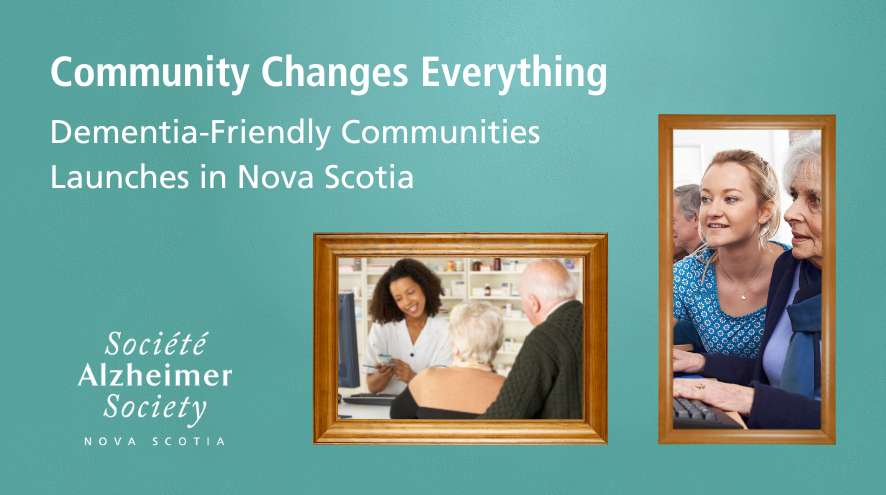Community Changes Everything: Dementia-Friendly Communities Nova Scotia
The Alzheimer Society of Nova Scotia is excited to announce the launch of our Dementia-Friendly Communities initiative in Nova Scotia! We are committed to connecting with key groups across Nova Scotia to help make our province more dementia friendly.

The Alzheimer Society of Nova Scotia is excited to announce the launch of our Dementia-Friendly Communities initiative in Nova Scotia! We are committed to connecting with key groups across Nova Scotia to help make our province more dementia friendly.
What is a Dementia-Friendly Community?
Dementia-Friendly Communities support, respect and include people living with dementia and their partners in care in the places they live, work and play. It’s a community that enables contribution, opportunity and choice.
Why is Becoming Dementia-Friendly Important?
When organizations, businesses, municipalities and the general public become dementia-friendly, it ensures people can age in place and remain active, engaged members of their communities. Dementia-friendly principles – both social and physical – are not just dementia friendly, but will make spaces more inclusive, supportive and accessible for everybody. Businesses, organizations and members of the community that are respectful and responsive to the needs of people affected by dementia are valued and integral to building a dementia-friendly society. It is our social responsibility to support ALL members of the community.
Social and physical characteristics of a dementia-friendly community can support people living with dementia by reducing anxiety, stigma and frustration. Many people living with dementia remain at home for a long time and with support from their community, can maintain a high quality of life. This is possible when community members are educated about dementia and know that a person living with dementia may sometimes experience the world differently.
What does a dementia-friendly environment look like?
Challenges with memory may make retracing a path and way-finding difficult. Thinking about the design and placement of signage can help to ensure spaces are welcoming and easily navigated. A few examples include:
Use clear signage with a high contrast between text (bold-plain text) with images that represent what is in the space (i.e. a toilet on a washroom door). It should be placed at eye level at key decision points and on the relevant doors (not beside them), or can be visible from all directions (on both sides of a corner).
Background noise should be kept to a minimum and a quiet space for customers is ideal.
Flooring should be plain. A shiny floor may look wet. Avoid dark mats, patterned flooring/carpets and undistinguished changes in floor level. Remove mats that could be a tripping hazard. Black mats could be perceived as holes or blue ones as water, and patterned floors are difficult to navigate.
Use recognizable (not abstract) seating that supports the upper back and has armrests to allow momentum to exit the chair. Armrests and a colour that contrasts with the floor will also support someone with impaired depth perception.
The changes don’t need to be costly or hard to implement. You can find helpful tip sheets with more suggestions at alzheimer.ca/DementiaFriendlyCanada or give us a call at 1-800-611-6345.
The Alzheimer Society of Nova Scotia is committed to advancing Dementia-Friendly Communities in Nova Scotia - communities that are more supportive, respectful and inclusive of people living with dementia and their care partners.
It is important to address the stigma associated with a dementia diagnosis. It’s also essential to understand how physical and social environments play a key role in people being able to stay connected to their social and community life and engage in regular daily activities of living.
Want to learn more? Are there already signs of dementia friendliness in your community? Invite us to present to your team or workplace about this initiative! Give us a call at 1-800-611-6345.
